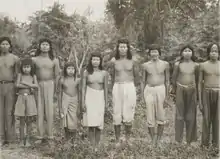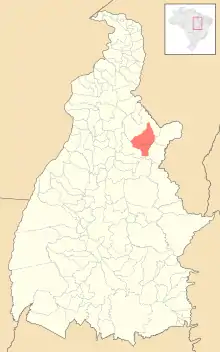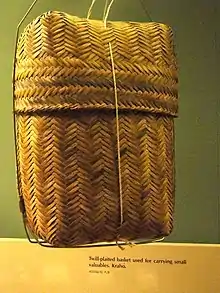Krahô
The Krahô (/ˈkrɑːhoʊ/, Portuguese: Craós) are an indigenous Timbira Gê people of northeastern Brazil. The Krahô historically inhabited a portion of modern Maranhão along the Balsas River, but were pushed west by pioneer settlement and cattle farmers.[1][2] Currently, the Krahô live on the Terra Indígena Kraolândia reservation in Tocantins.
Mehĩ | |
|---|---|
 | |
| Total population | |
| 2,000+ (1999) | |
| 1930 | 400 |
| 1989 | 1,198 |
| Regions with significant populations | |
| Tocantins, Brazil | |
| Languages | |
| Krahô, Portuguese | |
The Krahô have historically been seminomadic, practicing hunting and gathering and shifting cultivation.[3]
Terra Indígena Kraolândia
Modern Krahô live on the Terra Indígena Kraolândia, an Indigenous territory in the Goiatins and Itacajá, Tocantins near the Maranhão-Tocantins border. The territory has an area of 303,000 hectares (1,170 sq mi) and a population of 2992.[1][4]

Location of Terra Indígena Kraolândia Tocantins
References

Krahô basket in the American Museum of Natural History
- "Krahô - Povos Indígenas no Brasil". pib.socioambiental.org. Retrieved 2019-09-10.
- Callegari Jacques, Sidia M.; Salzano, Francisco M. (1979-07-01). "Demography and genetics of the Krahó and Gorotire Indians of Brazil". Journal of Human Evolution. 8 (5): 513–522. doi:10.1016/0047-2484(79)90041-1. ISSN 0047-2484.
- Mistry, Jayalaxshmi; Berardi, Andrea; Andrade, Valeria; Krahô, Txicaprô; Krahô, Phocrok; Leonardos, Othon (2005-06-01). "Indigenous Fire Management in the cerrado of Brazil: The Case of the Krahô of Tocantíns". Human Ecology. 33 (3): 365–386. doi:10.1007/s10745-005-4143-8. ISSN 1572-9915.
- "Terra Indígena Kraolândia | Drupal". terrasindigenas.org.br (in Spanish). Retrieved 2019-09-10.
This article is issued from Wikipedia. The text is licensed under Creative Commons - Attribution - Sharealike. Additional terms may apply for the media files.